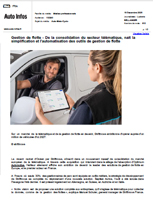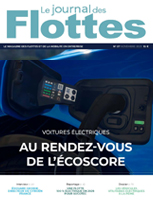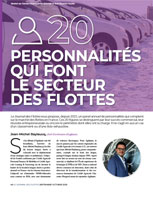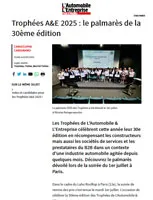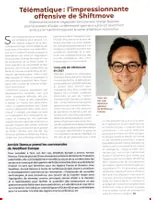
Presse écrite FRA
FLOTTES AUTOMOBILES
Famille du média : Médias professionnels
Périodicité : Mensuelle
Audience : 74 000
Sujet du média : Auto-Moto-Cyclo
Édition : Octobre 2022
P.34-36
Journaliste : Éric Gibory
Nombre de mots : 1564
Gestion de flotte : Des interfaces productives
Pour un responsable de parc, l'interfaçage de son outil de gestion de flotte, avec des fournisseurs ou bien interne, se traduit avant tout par un gain de temps important, une meilleure optimisation des coûts et, surtout, une gestion et une prise de décisions facilitées.
Des bénéfices également valables pour d'autres services de l'entreprise.
Les interfaces constituent un lien entre les fournisseurs de nos clients et notre outil numérique de gestion de flotte.
Du loueur jusqu'au convoyeur ou au prestataire de crédit de mobilité, l'objectif reste de remonter le maximum d'informations pertinentes pour le responsable de parc.
Cette observation émane de Géraud Porteu, directeur général de GAC Technology.
Chaque mois, cet éditeur de logiciels importe, pour ses clients, plus de 28 000 fichiers, soit plus de 36 millions de lignes de données.
Un TCO plus précis
Grâce aux interfaces, le responsable de parc bénéficie donc d'une vision plus précise de son TCO, avec à la clé une identification plus aisée des actions à lancer pour baisser les coûts.
« À titre d'exemple, les relevés kilométriques obtenus à partir des cartes carburant contribuent à identifier les dérives budgétaires », avance Marie-Noëlle Bobet, gestionnaire de flotte chez Optixt, l'éditeur du logiciel Winflotte.
« Et parallèlement à l'aspect économique d'optimisation du TCO, les interfaces jouent aussi un rôle dans la qualité de service, comme pour le covoiturage, avec des informations centralisées dans un outil unique », complète Géraud Porteu.
Communiquer avec les autres services
L'outil de gestion de flotte communique le plus souvent avec différents services de l'entreprise.
Car la flotte concerne aussi les RH, notamment pour gérer les avantages en nature (AEN), ou encore la comptabilité, pour traiter les notes de frais.
Plus largement, des interfaces sont aussi créées pour la réservation des véhicules gérés en pool, pour l'utilisation des véhicules en autopartage par les salariés le week-end ou en soirée, etc.
Chez GAC Technology, l'outil GAC Car Fleet récupère par exemple les informations des départements RH pour attribuer les coûts à un centre de profit précis.
Le responsable de parc peut alors savoir si tel collaborateur est passé de tel à tel service et à quelle date, pour imputer les coûts précis à chaque entité.
Pour certains grands comptes, GAC Technology assume pareillement des tâches comptables.
Dans GAC Car Fleet, des factures peuvent ainsi être validées puis envoyées au service de la comptabilité.
Une aide à la décision
« Les interfaces amènent à collecter et à échanger de la donnée, élément fondamental sur lequel repose la prise de décision du gestionnaire de flotte à travers les algorithmes et les applications », valide Daniel Vassallucci, président du télématicien Optimum Automotive. Pour ce gestionnaire, les enjeux sont multiples et nécessitent de s'appuyer sur des données, mais aussi des algorithmes et des outils pour maîtriser ces données. Les interfaces agrègent alors le maximum d'informations pour que l'algorithme prenne les bonnes décisions », poursuit Daniel Vassallucci. De bonnes décisions qui peuvent concerner l'électrification du parc, la diminution de l'empreinte environnementale, le renouvellement des véhicules, la car policy, la prévention des risques routiers, etc. « Quand l'entreprise a pris le temps d'apprivoiser les données avec Toutil, le processus de décision se fait plus objectif », ajoute-t-il.
Plus de temps, moins d'erreurs
Au-delà de ces avantages, le temps gagné représente un autre bénéfice important apporté par les interfaces, notamment en évitant la double saisie. Un constat encore plus vrai lorsque ces données sont mises à disposition de l'ensemble de l'entreprise, via les outils internet classiques comme l'e-mail, ou qu'elles s'intègrent directement dans les outils de CRM, les ERP ou les logiciels de comptabilité. En interne, les échanges se font alors le plus souvent avec la direction générale, les ressources humaines, les finances, la comptabilité, en évitant, grâce aux interfaces, de ressaisir ces données. « Les interfaces évitent les erreurs induites par une double saisie des données », insiste Marie-Noëlle Bobet pour Optix. Toujours dans une optique de bonne gestion, ces interfaces peuvent aussi se connecter aux systèmes informatiques.
BPCE Car Lease échange avec ses clients
BPCE Car Lease, loueur multimarques, est à la tête d'une flotte de 38 000 véhicules dont trois quarts de VP et un quart de VUL. À travers la plate-forme d'Optimum Automotive, BPCE Car Lease diffuse les données de leurs véhicules à ses différents clients. « Les interfaces ont un impact énorme sur les missions des gestionnaires de flotte, estime Christophe Mangin, expert LLD, pricing et nouveaux produits au sein de la direction des opérations de ce loueur. Quand nous mettons en place un contrat, nous nous assurons que les flux de données sont partagés. Cette connectivité va de l'échange de fichiers par e-mails, jusqu'à de l'extranet machine to machine. » Les informations collectées par BPCE Car Lease sont retransmises auprès des clients à partir de sa plate-forme dédiée. Chaque entreprise garde la possibilité d'agréger des prestataires extérieurs à ce hub. C'est le cas notamment quand l'entreprise ne souscrit pas la prestation des pneus auprès du loueur mais fait appel à un réseau spécialisé. « Pour qu'elles remplissent leur office, les interfaces doivent être les plus simples et les plus discrètes possibles, souligne Christophe Mangin. Le fichier recherché doit être téléchargeable en moins de cinq minutes. Les interfaces doivent aussi offrir une historisation de l'ensemble des données et assurer une connectivité avec tout nouvel opérateur. »
Pour BPCE Car Lease, passer d'Excel à une plate-forme connectée génère un gain de 15 à 20 % sur le temps passé à gérer la flotte. De plus, le gestionnaire obtient une visibilité complète sur son TCO et son TCM. Il est aussi capable d'évaluer le coût des nouvelles mobilités. Les interfaces offrent ainsi l'opportunité de déployer une mobilité multimodale, avec une remontée des informations sur des services plus récents comme le vélo-partage. C'est le cas de celui de l'ANTAI (Agence nationale de traitement automatisé des infractions), avec lequel une entreprise peut échanger sur les infractions routières relevées et l'identité des conducteurs verbalisés. Dans ce cadre, des fichiers RH régulièrement mis à jour permettent, en cas de requête, de désigner le conducteur responsable de l'amende, avec ses coordonnées exactes.
Une gestion facilitée dans le groupe Pernod Ricard
Cette facilitation de la gestion et le gain de temps qui en découle sont mis en avant au sein du groupe Pernod Ricard, utilisateur de l'outil Winflotte. « Les interfaces génèrent un gain de temps important. La gestion de flotte n'a plus à valider toutes les factures des loueurs, et la comptabilité n'a plus à les traiter manuellement. Ces interfaces contribuent aussi à une meilleure optimisation. Nous tendons vers l'excellence opérationnelle, d'où notre volonté de réduire le nombre de procédures manuelles. Autre bénéfice, le risque d'erreurs se réduit et nous obtenons un reporting des anomalies », expose Maeva Roubaud, responsable du parc automobile de 750 véhicules du spécialiste des vins et spiritueux (voir le témoignage page 34). Ce que confirme Franck Lallet, responsable commercial de l'éditeur de logiciels de gestion de flotte Informakit : « Nous constatons parfois qu'avec les tableaux Excel, le gestionnaire passe tellement de temps à saisir qu'il n'en a plus pour analyser les coûts de sa flotte. »
Des cas concrets
Audrey Leroy ne le contredira pas. Cette gestionnaire d'un parc de 1 200 véhicules travaille pour Orexad Brammer, un distributeur de fournitures industrielles qui a opté pour l'outil de GAC Technology. « Le logiciel et ses interfaces apportent un gain de temps considérable. Face à Excel, c'est incomparable, rappelle-t-elle. Avec le lien avec l'ANTAI, nous passons aussi moins de temps à traiter les PV et nous réalisons une économie importante de papier. Notre service de gestion de flotte compte trois personnes. Sans GAC Car Fleet et avec Excel, nous aurions besoin d'une personne en plus pour assurer les mêmes missions », détaille Audrey Leroy. Qui pointe aussi la simplicité pour créer une interface. « Pour ce faire, GAC Technology nous fournit un e-mail type pour demander au fournisseur de faire le nécessaire en lien avec ses équipes. Quand nous rachetons une entreprise, je demande ainsi à l'éditeur et aux fournisseurs d'intégrer les nouvelles données », poursuit-elle (voir le témoignage ci-dessous).
Mais les outils informatiques ne dispensent pas le gestionnaire de flotte d'un travail de contrôle des éléments qui apparaissent dans son logiciel. À titre d'exemple, si une immatriculation n'est pas reconnue par un fichier de facturation, ce gestionnaire doit procéder aux vérifications nécessaires.
Zéro papier, zéro saisie
Grâce aux interfaces et aux outils informatiques, certaines entreprises ne saisissent plus aucune donnée liée à leurs dépenses. Au-delà de la facturation, cette pratique va certainement se généraliser à l'ensemble des prestataires de l'écosystème des flottes et à l'ensemble des départements de l'entreprise. Après le « zéro papier », les entreprises peuvent viser désormais le « zéro saisie ».
Éric Gibory



